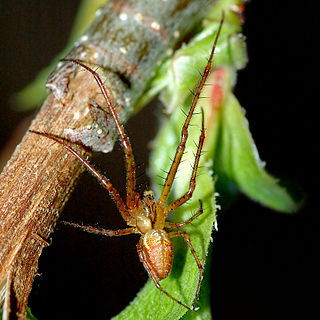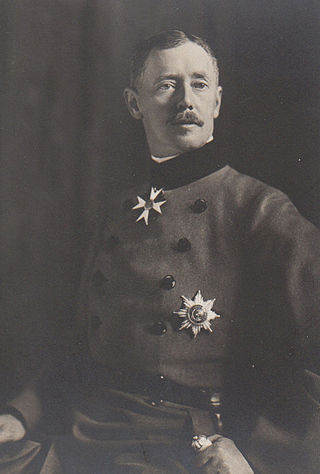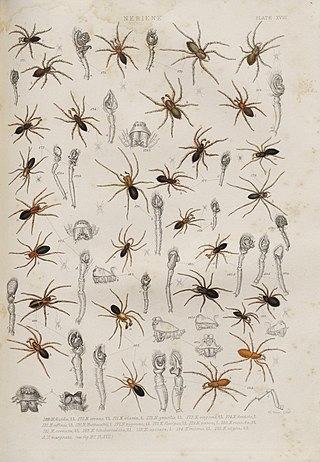
The Thomisidae are a family of spiders, including about 170 genera and over 2,100 species. The common name crab spider is often linked to species in this family, but is also applied loosely to many other families of spiders. Many members of this family are also known as flower spiders or flower crab spiders.

Orb-weaver spiders are members of the spider family Araneidae. They are the most common group of builders of spiral wheel-shaped webs often found in gardens, fields, and forests. The English word "orb" can mean "circular", hence the English name of the group. Araneids have eight similar eyes, hairy or spiny legs, and no stridulating organs.

Linyphiidae, spiders commonly known as sheet weavers, or money spiders is a family of very small spiders comprising 4706 described species in 620 genera worldwide. This makes Linyphiidae the second largest family of spiders after the Salticidae. The family is poorly understood due to their small body size and wide distribution; new genera and species are still being discovered throughout the world. The newest such genus is Himalafurca from Nepal, formally described in April 2021 by Tanasevitch. Since it is so difficult to identify such tiny spiders, there are regular changes in taxonomy as species are combined or divided.

Long-jawed orb weavers or long jawed spiders (Tetragnathidae) are a family of araneomorph spiders first described by Anton Menge in 1866. They have elongated bodies, legs, and chelicerae, and build small orb webs with an open hub with few, wide-set radii and spirals with no signal line or retreat. Some species are often found in long vegetation near water.

Zoropsidae, also known as false wolf spiders for their physical similarity to wolf spiders, is a family of cribellate araneomorph spiders first described by Philipp Bertkau in 1882. They can be distinguished from wolf spiders by their two rows of eyes that are more equal in size than those of Lycosidae.

Myrmarachne is a genus of ant-mimicking jumping spiders that was first described by W. S. MacLeay in 1839. They are commonly called ant-mimicking spiders, but they are not the only spiders that have this attribute. The name is a combination of Ancient Greek μύρμηξ, meaning "ant", and ἀράχνη, meaning "spider".

Theridiosomatidae, commonly known as Ray Spiders, are a family of araneomorph spiders first described by Eugène Simon in 1881. The family includes 137 species divided between 20 genera. They are most recognizable for their construction of cone-shaped webs.

Ordgarius is a genus of orb-weaver spiders first described by Eugen von Keyserling in 1886. Adult females of the genus are bolas spiders, capturing their prey with one or more sticky drops at the end of a single line of silk rather than in a web. Males and juvenile females capture their prey directly with their legs.

Friedrich Ferdinand, Duke of Schleswig-Holstein-Sonderburg-Glücksburg, then Friedrich Ferdinand, Duke of Schleswig-Holstein, was the fourth Duke of Schleswig-Holstein-Sonderburg-Glücksburg and became the fifth Duke of Schleswig-Holstein in 1931.
Trematocephalus tripunctatus, is a species of spider of the genus Trematocephalus. It is endemic to Sri Lanka.

Centromerus is a genus of dwarf spiders that was first described by David B. Hirst in 1886.

Hypomma is a genus of dwarf spiders that was first described by David B. Hirst in 1886.

Macrargus is a genus of dwarf spiders that was first described by Friedrich Dahl in 1886.

Micrargus is a genus of dwarf spiders that was first described by Friedrich Dahl in 1886.
Microctenonyx is a genus of dwarf spiders that was first described by Friedrich Dahl in 1886.

Moebelia is a genus of dwarf spiders that was first described by Friedrich Dahl in 1886.














